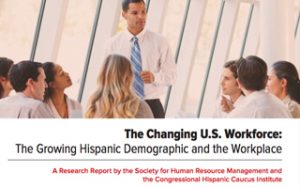CHCI and SHRM Release Joint Report on Skills Gap in the Latino Workforce
Policy makers, business owners and others urged to invest in workforce development and education
The Society for Human Resource Management (SHRM) and CHCI (Congressional Hispanic Caucus Institute) today released a joint report titled The Changing U.S. Workforce: The Growing Hispanic Demographic and the Workplace.
The report, which was released during CHCI’s 2016 Public Policy Conference, provides the latest research and high-level insights from experts on the challenges and opportunities presented by the influx of Hispanics into the workforce to ensure that this generation of workers enter the labor market not only career-ready, but also with marketable skills and hands-on experiences that match the needs of the economy.
In the report, CHCI and SHRM identify effective practices to close the skills gap that exists in the Latino workforce. The two organizations urge policy makers, business owners and other decision makers to invest in workforce development and education.
Those effective practices and strategies include:
- Developing tools to support and improve educational and career outcomes such as structured pathways from college to certain jobs and mentoring to help address the lack of soft skills.
- Facilitating training programs and apprenticeships for entry-level workers to create foundations for success.
- Utilizing creative benefits to help recruit and retain Hispanic Millennials.
“Organizations must adopt employment practices that leverage demographic change to the advantage of both employers and employees,” said J. Robert Carr, senior vice president at SHRM. “This important report provides employers effective ways to harness the power of diversity and engage Hispanic Millennials. With these and other promising HR practices, workplaces will be more inclusive, productive and successful.”
“The greatest challenge that we must address is the alarming skills gap in the Hispanic workforce, where many Latinos are not prepared to compete for the jobs of today and tomorrow,” said Domenika Lynch, CHCI president and CEO. “I am confident that by educating all stakeholders on this issue and acting with urgency, our community can address the workforce development challenges that lie ahead. It is imperative for the future health of the country to ensure that we properly train Latinos with the needed skills to compete for the jobs of the 21st century.”

